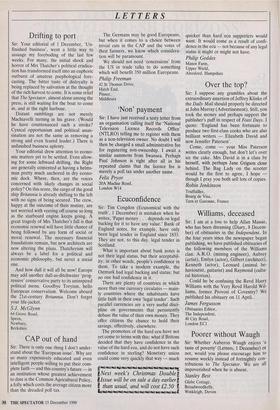Ecuconfidence
Sir: Tim Congdon (Ecunomical with the truth', 1 December) is mistaken when he writes, 'Paper money. . . depends on legal backing for it to have any value.' Bank of England notes, for example, have only been legal tender in England since 1833. They are not, to this day, legal tender in Scotland.
What is important about bank notes is not their legal status, but their acceptabil- ity; in other words, people's confidence in them. To take a modern example, the Ostmark had legal backing and status; but no one had confidence in it.
There are plenty of countries in which more than one currency circulates — main- ly countries where the inhabitants have little faith in their own 'legal tender'. Such parallel currencies are a very useful disci- pline on governments that persistently debase the value of their own money. They offer citizens the chance to hold their savings, effectively, elsewhere.
The promoters of the hard ecu have not yet come to terms with this: what if Britons decided that they have confidence in the value of the hard ecu, and do not have such confidence in sterling? Monetary union could come very quickly that way — much quicker than hard ecu supporters would want It would come as a result of confi- dence in the ecu — not because of any legal status it might or might not have.
Philip Geddes
Manor Farm, Upper Wield, Alresford, Hampshire


























































 Previous page
Previous page